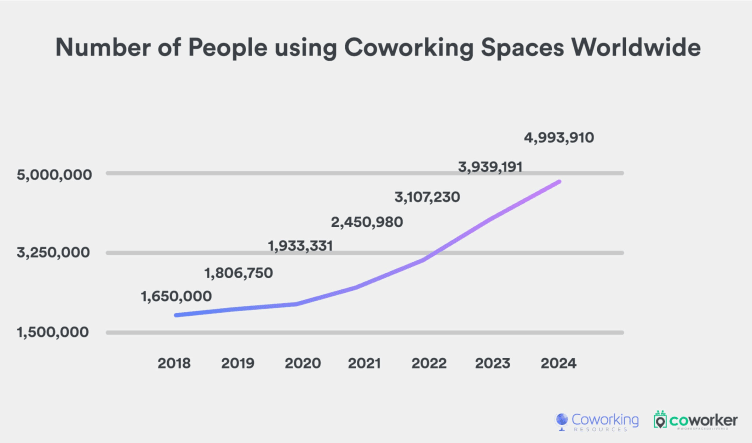Still worth the hype? The real benefits of co-working in 2021.
Co-working spaces are here to stay.
In 2019 a global study by CoworkingResources reported that the number of co-working spaces worldwide was tipped to exceed 20,000 and predicted to grow another 42% between 2019 and 2022. Despite a slowed market in 2020, the rebound of the market globally means there it is now estimated that 5 million people worldwide will be working from coworking spaces by 2024, an increase of 158% compared to 2020.
Image source: https://www.coworkingresources.org/blog/key-figures-coworking-growth
Image source: https://www.coworkingresources.org/blog/key-figures-coworking-growth
The flexibility offered by these spaces – which are typically set up to enable people to work individually or collaboratively in a comfortable shared work environment – answers the global shift towards remote and flexible work, as well as projects where teams need to work together for a concentrated period of time.
Memberships to co-working spaces allow for flexible schedules and provide the physical infrastructure and equipment needed to do work, without the overheads of long office leases. A recent report by Regus declared that more than half of the world’s employees now work externally to their office for 2.5 days a week or more, so it’s easy to see that the co-working model represents significant cost savings for employers.
HOW CO-WORKING SPACES IMPROVE PEOPLE’S WORK
Anyone who’s set foot in a great co-working space (and they’re not all created equal – let’s be clear about that) can describe the appeal. Slick fitouts with new equipment, breakout spaces interspersed with zones for quiet work, unstuffy conference rooms, COFFEE, the quiet buzz of people getting stuff done...
Or are they? How productive are individuals and project teams in co-working spaces? Pretty productive actually, according to research. Here’s why.
STRUCTURED AUTONOMY
While co-working spaces cater to flexible hours and allow people to work in ways that suit them best (autonomy), they are also hives of activity that inspire a healthy level of discipline (structure). The best spaces offer the comforts of home without the distractions – a best-of-both-worlds alternative to rigid traditional offices and working from home.
University of Michigan researchers who interviewed several co-working space founders and community managers, and surveyed several hundred workers from dozens of co-working spaces around the US, noted that:
“Too much autonomy can actually cripple productivity because people lack routines. Coworkers reported that having a community to work in helps them create structures and discipline that motivates them. Thus, paradoxically, some limited form of structure enables an optimal degree of control for independent workers.”
Results of a survey by GCUC and Emergent Research suggest the same thing:
84% said they were more engaged and motivated when co-working
69% said they feel more successful since joining a co-working space.
Tied in with this, of course, are the obvious benefits to work-life balance. Because co-working spaces are agile enough to facilitate fluid schedules, they allow people to work more efficiently while juggling their commitments outside of work.
COMMUNITY
The increasing amount of work that’s now being done online has distinct advantages, but it has also eroded the time we spend offline talking to people face-to-face. We’re hurtling into a digital future, which is exhilarating in many ways, but as humans we’re still hardwired for interpersonal connection.
Co-working spaces provide a neat solution, fulfilling our need for a sense of community. By ensuring that we aren’t isolated in our work, they also provide avenues for knowledge-sharing, networking, learning new things and socialising with a diverse range of people we wouldn’t otherwise meet.
Of GCUC’s survey respondents:
82% said co-working has expanded their professional network
80% said they turn to other co-working members for help or guidance
64% said their co-working networking was a very important (26%) or important source of work (38%).
MEANING
It seems that the combination of a well-designed work environment and a well-curated working experience in co-working spaces compared to old-school offices helps people to thrive because they’re able to be themselves.
The University of Michigan researchers note that “in reality, people need to be able to craft their work in ways that give them purpose and meaning. They should be given control and flexibility in their work environment”. When they’re able to do that – and when they get the opportunity to describe their work to other people and build professional and social connections – their perception of themselves and their work is elevated.
The shift away from competition and towards collaboration can make work more interesting, more dynamic and ultimately more fulfilling – which could explain why 89% of surveyed respondents reported that co-working makes them happier.
CO-WORK @ CORE
At CORE Innovation Hub, we’re creating a more meaningful and productive work experience. We’re Australia’s first co-working, collaboration and innovation hub focused on the resources and energy sector. Our shared work environment drives collaboration, open innovation and new enterprise to help address industry’s evolving challenges. With space in Perth and two new spaces coming in Newman and Adelaide, CORE provides flexible and accessible co-working services where you need them.
Interested? Contact us today.





